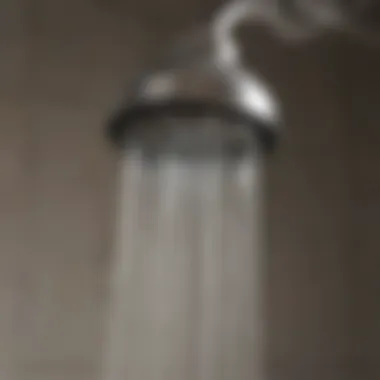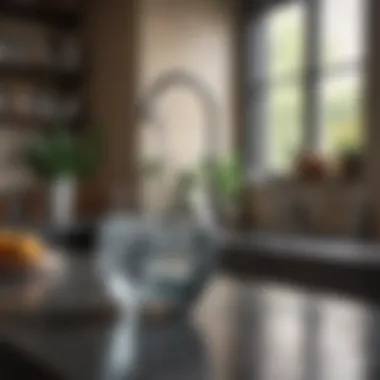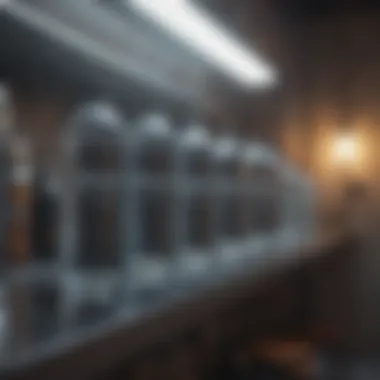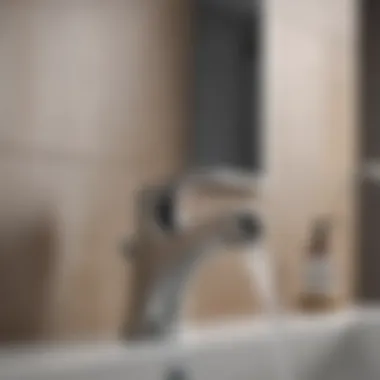Effective Strategies for Removing Hard Water


Intro
Hard water is a common issue many homeowners face. It contains a high concentration of minerals, primarily calcium and magnesium. These minerals can lead to various problems such as scale buildup on faucets, showerheads, and inside appliances. Understanding how to effectively remove hard water and maintain results is crucial for preserving the longevity of household items. This article will delve into the methods available for hard water removal, exploring both natural solutions and commercial products, along with preventative measures. By the end, readers will gain insight into practical strategies that address one of the most persistent challenges in household maintenance.
Understanding Hard Water
Before diving into removal strategies, it's important to understand what hard water is. Hard water results from water passing through limestone or chalk, collecting minerals along the way. These minerals can cause mineral deposits, which are often white or cloudy residue found in kitchens and bathrooms.
The presence of hard water can affect not only plumbing systems but also skin and hair. For example, individuals may find that soap does not lather well, leading to a feeling of being unclean, and hair can appear dull and lifeless due to mineral buildup. Understanding these impacts helps to underscore the importance of addressing hard water.
Effective Removal Techniques
Addressing hard water requires a combination of removal techniques, tailored to specific surfaces and situations. Here are some effective strategies that can be employed:
Natural Remedies
- Vinegar: White vinegar is a powerful and readily available natural solution. Its acidity helps to dissolve mineral deposits. To use, mix equal parts vinegar and water in a spray bottle, apply to the affected surface, and let sit for a few minutes before wiping clean.
- Baking Soda: For tougher stains, a paste of baking soda and water can be effective. Rub this paste on the stained area. After a few minutes, scrub and rinse thoroughly.
- Lemon Juice: The citric acid in lemon juice can also help to break down hard water stains. For best results, apply fresh lemon juice to the area, let sit, and then scrub.
Commercial Solutions
In addition to natural remedies, several commercial products specifically target hard water stains. Examples include:
- Calgon Water Softener: Designed to be added during laundry to soften water and prevent mineral deposits.
- CLR (Calcium, Lime, and Rust Remover): This product is effective for a range of surfaces and is particularly useful for metal fixtures.
- Hard Water Stain Remover Spray: Available at most home improvement stores, these products provide direct application solutions for showers and faucets.
Preventative Measures
Preventing hard water buildup is just as important as removal. Some advisable strategies include:
- Water Softener Installation: Consider installing a water softener in your household. This device changes the composition of water before it enters your plumbing systems.
- Regular Cleaning: Establish a routine cleaning schedule using vinegar or commercial solutions to prevent buildup from becoming severe.
- Squeegee Use: After showering, using a squeegee on glass doors can minimize water spots and buildup.
"Regular maintenance can significantly reduce the effort needed for hard water removal. Establishing a routine is key to combating future buildup."
Closure
Tackling hard water involves understanding its composition and effects. By employing effective removal methods alongside preventative measures, homeowners can protect their surfaces and appliances from the damaging effects of hard water. Through natural solutions and reliable commercial products, it is entirely feasible to manage and mitigate the impacts of this common household issue. These strategies not only enhance home aesthetics but also ensure longevity and functionality, minimizing the need for costly repairs or replacements.
Understanding Hard Water
Understanding hard water is essential for effectively addressing the challenges it poses in households. Hard water is prevalent across many regions and poses a significant risk to both plumbing and appliances. Recognizing the composition and properties of hard water provides vital insights into why efficient removal strategies are necessary.
What is Hard Water?
Hard water contains high levels of dissolved minerals, usually calcium and magnesium. This occurs when water passes through limestone or chalk formations. These compounds can result in mineral buildup, affecting plumbing and appliances. Both homeowners and apartment dwellers need to recognize the characteristics of hard water to mitigate its effects.
Common Minerals in Hard Water
Several minerals contribute to the hardness of water:
- Calcium Carbonate: Mostly found in areas with limestone geology.
- Magnesium Sulfate: Commonly present along with calcium.
- Iron: Can create rust stains in faucets and fixtures.
Each of these minerals can influence the performance of appliances and lead to repair costs if left unchecked.
Impact of Hard Water on Household Items
Hard water can have adverse effects on various household items, including:
- Appliances: Dishwashers and washing machines may suffer from mineral deposits, leading to reduced efficiency.
- Fixtures and Faucets: These can develop unattractive stains and deposits that require constant cleaning.
- Clothing: Fabrics washed in hard water may appear dull due to mineral residue that does not rinse out easily.


Effective knowledge about hard water allows for proactive measures, preserving both home efficiency and aesthetics.
By learning about these aspects of hard water, homeowners can adopt suitable methods for prevention and removal, ensuring their living spaces remain functional and visually appealing.
Identifying Hard Water Problems
Identifying hard water problems is crucial for maintaining a clean and efficient home. Hard water can cause various issues, such as scaling in plumbing and appliances, which can lead to costly repairs or replacements. Understanding these problems is the first step toward implementing effective solutions. Addressing hard water issues not only improves the longevity of your appliances but also enhances the quality of your water.
Signs and Symptoms of Hard Water
Detecting hard water is often possible through visual clues and performance issues. Here are some common signs:
- Scale Buildup: This appears as white, chalky deposits around faucets, showerheads, and sinks. It is often a direct result of calcium and magnesium in the water.
- Soap Scum: When hard water interacts with soap, it leads to a film that clings to surfaces, making it challenging to clean bathrooms and kitchens.
- Reduced Lather: If you notice that soap does not lather well, it may be due to hard water interfering with cleaning products.
- Stains on Washed Items: Clothes washed in hard water may come out with a dingy appearance or grayish stains. This is because minerals can deposit on clothing fibers.
- Dry Skin and Hair: Hard water can strip moisture, leading to skin irritation or hair that feels lifeless.
Understanding these signs helps in confirming the presence of hard water, which is vital for deciding the best course of action.
How Hard Water Affects Appliances
Appliances are significantly impacted by hard water. Over time, mineral deposits can cause:
- Inefficiency in Heating Elements: Water heaters often accumulate scale, which can reduce their efficiency. This can lead to higher energy costs and premature failure.
- Dishwashers: Hard water leads to cloudy glassware and film on dishes, making them appear dirty after washing.
- Washers: Washing machines can also suffer from scale, leading to potential clogs and reduced performance.
- Coffee Makers and Kettles: These appliances require regular cleaning due to scale buildup that can affect taste and functionality.
Regular maintenance and understanding the impact of hard water on these appliances can save homeowners from significant expenses and frustration. Addressing these problems early can lead to increased efficiency, improved appliance lifespan, and better overall performance.
Methods for Removing Hard Water Stains
Removing hard water stains is crucial for maintaining the appearance and longevity of various surfaces and appliances in your home. Hard water contains high levels of minerals like calcium and magnesium, which can lead to buildup on faucets, shower doors, tiles, and glassware. These unsightly stains can also cause appliances such as dishwashers and water heaters to work less efficiently, increasing energy costs.
Addressing hard water stains not only improves your home's aesthetic, but it also prevents damage to your household items. By using the right removal techniques, you can save money on repairs or replacements, extend the life of your appliances, and enhance the overall quality of your home. Below are specific methods that can effectively tackle hard water stains.
Vinegar and Water Solution
A simple yet powerful method involves using a vinegar and water solution. Vinegar is acidic, which helps to dissolve mineral deposits from hard water. To prepare this solution, mix equal parts of distilled white vinegar and water in a spray bottle.
Application:
- Spray the solution directly onto the stained surface.
- Allow it to sit for 10-15 minutes. This waiting period lets the vinegar penetrate the mineral deposits.
- Wipe with a soft cloth or sponge, then rinse thoroughly with water to remove any residue.
This method is especially effective on glass shower doors and faucets, as it can restore clarity and shine. Additionally, vinegar is non-toxic, making it a safe option for homes with children and pets.
Baking Soda Paste
Another effective strategy for removing hard water stains is using a baking soda paste. Baking soda, or sodium bicarbonate, has mild abrasive properties that help scrub away mineral deposits. To create this paste, mix baking soda with a small amount of water until it reaches a thick consistency.
Application:
- Apply the paste directly to the stained areas, focusing on stubborn spots.
- Use a soft cloth or sponge to gently scrub the surface.
- Rinse with water and dry with a clean cloth.
This method works well for tiles and grout lines, as the granular texture of baking soda can reach into crevices and lift stains effectively.
Commercial Cleaning Products
There are numerous commercial cleaning products specifically designed to combat hard water stains. These products often contain stronger acids or chelating agents that break down mineral deposits efficiently. When selecting a cleaner, look for products labeled for hard water removal or limescale prevention.
Considerations:
- Always read and follow the manufacturer's instructions to avoid damaging surfaces.
- Test the product on a small, inconspicuous area before applying it broadly.
- Ensure adequate ventilation when using chemical cleaners, as they may emit strong fumes.
Using these products can yield fast results, particularly in kitchens and bathrooms.


Using Lemon Juice
Lemon juice serves as a natural alternative for removing hard water stains. The citric acid in lemon breaks down mineral buildup in a gentle yet effective manner.
Application:
- Squeeze fresh lemon juice onto the stained area or apply lemon slices directly.
- Let it sit for about 5-10 minutes.
- Wipe with a cloth and rinse thoroughly.
This method not only helps in removing stains but also leaves surfaces smelling fresh. Lemon juice is a good option for those looking to use more eco-friendly cleaning solutions.
"Employing various removal techniques will ensure surfaces are returned to their optimal condition while preserving their lifespan."
In summary, using vinegar and water, baking soda paste, commercial products, or lemon juice can effectively tackle hard water stains. Each method has unique benefits, and the choice largely depends on the nature of the stain and the surface in question.
Preventative Measures Against Hard Water
Preventing hard water issues is crucial in maintaining your home’s appliances and surfaces. With the right strategies, one can effectively reduce the buildup of minerals, extending the life of household items and ensuring consistent performance. This section explores practical steps that homeowners can take to mitigate the effects of hard water.
Water Softening Systems
Investing in a water softener can be one of the most effective ways to address hard water issues. Water softeners replace the calcium and magnesium ions, which are responsible for water hardness, with sodium ions. This process minimizes mineral buildup in pipes and appliances, preventing clogs and enhancing efficiency.
Available options include:
- Salt-based softeners: These are common and work through ion exchange.
- Salt-free softeners: These systems condition the water without removing minerals.
- Reverse osmosis systems: These systems filter water, removing impurities and excess minerals, providing an extra layer of protection.
When selecting a water softener, consider the size of your household and the current hardness level of your water. Regular maintenance is essential for any system you choose, ensuring continued effectiveness in reducing hard water issues.
Regular Maintenance of Appliances
Maintaining household appliances is key to combating hard water effects. Appliances like dishwashers and washing machines often experience mineral buildup, leading to inefficiency and potential failures. Establishing a routine maintenance schedule can help sustain their performance.
Key maintenance practices include:
- Descaling appliances: Use commercial descaling products or natural agents annually to prevent scale buildup.
- Cleaning filters: Regularly check and clean filters in dishwashers and washing machines to keep them functioning optimally.
- Water removal after use: For appliances that use water, like coffee makers, emptying them after each use can help reduce mineral sediment.
Incorporating these practices can lead to significant long-term savings by preventing costly repairs and replacements due to damage from hard water.
Strategies for Different Surfaces
Minimizing the effects of hard water often requires distinct strategies based on the surface being cleaned. This is important because the corrosive properties of hard water can damage various materials differently. Identifying the correct approach for each surface not only ensures effective removal of stains but also preserves their longevity. Therefore, appropriate strategies reduce the frequency of cleaning and maintenance needed over time.
Removing Hard Water from Faucets
When it comes to faucets, a common sight is the buildup of white mineral spots. These can be unsightly and can actually impede water flow over time if left unattended. To clean faucets effectively, use a mixture of equal parts white vinegar and water. Soak a cloth in this solution and wrap it around the faucet. Let it sit for about 30 minutes, then wipe off the grime. If needed, an old toothbrush can assist in scrubbing the hard-to-reach areas. This method is gentle yet effective, ensuring the finish of the faucet is not compromised.
Dealing with Shower Doors
Shower doors tend to accumulate hard water stains rapidly, making them difficult to maintain. A solution of vinegar and baking soda can be particularly effective. First, spray the shower doors with the vinegar and let it sit for a few minutes. Then, sprinkle baking soda onto the area, creating a fizz that helps lift stains. After scrubbing with a soft sponge, rinse thoroughly. Regular cleaning with this method not only removes the stains but also aids in preventing new ones from forming.
Cleaning Tiles and Grout
Tiles and grout can suffer from significant staining caused by hard water. To combat this, you may create a paste using baking soda and water. Apply this paste to the stained grout and tiles, allowing it to rest for at least 15 minutes. After that, scrub the areas with a brush. For an added boost, using a mixture of hydrogen peroxide with baking soda can yield better results. This approach ensures your tiles remain bright and your grout persisting white.
Tackling Glassware and Dishware
Hard water can leave behind cloudy spots on glassware and dishware, making them look unappealing. To clean these items effectively, fill a basin with equal parts vinegar and water. Soak the glassware for about 10-15 minutes, then rinse them under warm water. For stubborn stains, a mild abrasive cleaner can be used alongside washing. It's crucial to ensure thorough rinsing to avoid any residues. This process not only enhances the clarity of glassware but also prolongs its lifespan.
Using customized cleaning plans for each surface allows homeowners to maintain their appliances and fixtures without undue effort or damage.


By employing context-specific methods, you can greatly improve your cleaning regimen, ensuring surfaces are treated correctly and effectively.
Eco-Friendly Approaches
Addressing hard water issues in a sustainable manner is increasingly important for homeowners aiming to maintain a healthy household while minimizing environmental impact. Eco-friendly approaches to hard water removal focus on using natural solutions and reducing reliance on harsh chemicals. These methods not only protect the environment but also ensure safety for family members and pets.
Homeowners often seek solutions that are both effective and sustainable. The use of natural cleaning agents is one effective strategy that aligns these objectives. This section will detail natural cleaning agents, their benefits, and the advantages of adopting eco-friendly solutions.
Using Natural Agents for Cleaning
Natural agents for cleaning are often less harmful to both people and the environment. Some commonly used natural cleaning agents include:
- Vinegar: This acidic substance effectively dissolves mineral buildup caused by hard water. It is suitable for various surfaces such as glass, ceramics, and metal fixtures.
- Baking Soda: Known for its mild abrasive properties, baking soda can help scrub away stains without damaging surfaces. It can also neutralize odors, making it a dual-purpose agent in cleaning.
- Lemon Juice: The acidity in lemon juice can break down mineral deposits while leaving a pleasant scent. Its antibacterial properties also add an extra layer of cleanliness.
When combined with water, these natural agents become effective solutions to combat hard water stains. A simple mixture of vinegar and water can clear faucets and showerheads, keeping them free from buildup and visually appealing.
The preparation of natural cleaning agents is straightforward and requires minimal equipment. Homeowners can easily mix these solutions at home, promoting an eco-friendly cleaning routine.
Advantages of Eco-Friendly Solutions
Using eco-friendly solutions for cleaning has numerous advantages. Here are some key benefits:
- Healthier Home Environment: Natural cleaning agents do not emit harmful chemicals or fumes. This reduces the risk of respiratory irritation and allergic reactions, contributing to a safer home environment.
- Environmentally Safe: When natural agents are disposed of, they typically break down more easily in the environment compared to synthetic chemicals. This helps to reduce pollution and protect local ecosystems.
- Cost-Effectiveness: Natural cleaning products can often be made from common household items, making them cheaper than commercial cleaning solutions. In the long run, this can lead to significant savings.
- Enhanced Surface Longevity: Harsh chemicals can erode surfaces over time. Eco-friendly agents are generally milder and can help extend the lifespan of appliances and fixtures.
"Incorporating eco-friendly cleaning solutions into your routine not only benefits your health but also supports the environment."
Long-Term Solutions to Hard Water Issues
Addressing hard water problems often requires immediate attention to stains and build-up. However, long-term solutions are essential for preventing ongoing issues and sustaining the cleanliness and functionality of household items. The approach to managing hard water effectively focuses on investments in technology and adjustments to water sources. Such strategies can drastically reduce the impact of hard minerals on surfaces and appliances.
Investing in a Water Softener
Investing in a water softener is one of the most effective long-term strategies for hard water issues. A water softener works by exchanging harmful calcium and magnesium ions found in hard water with sodium or potassium ions. This not only prevents hard water stains but also prolongs the lifespan of appliances such as dishwashers and washing machines.
- Benefits of water softeners include:
- Reduction in scale buildup on faucets and showerheads.
- Enhanced soap efficiency, leading to cleaner dishes and laundry.
- Lower energy costs as appliances run more efficiently.
- Less frequent need for cleaning supplies specifically targeting hard water stains.
When considering a water softener, there are several factors to take into account. The size and capacity of the unit should align with the household's water usage. Additionally, it is important to review the maintenance requirements of the system, as regular salt refills are necessary for optimal functionality. Different brands, such as Culligan and Fleck, offer various models suitable for different household needs.
Altering Water Supply Sources
In some cases, it may be beneficial to alter the water supply source if hard water is a persistent issue. This option is less common, as not all homeowners have the flexibility to change their water sources; however, it can be a viable long-term strategy in certain situations.
- Water source alternatives may include:
- Switching to municipal water supplies that have softening processes in place.
- Using alternative well water sources if available and known to be softer.
- Implementing rainwater harvesting systems, which generally produce softer water.
It is crucial to conduct a water quality test to evaluate the hardness levels before making such changes. Assessment ensures that the new source will provide a noticeable improvement in water quality. Additionally, not all methods are accessible or practical for every home, so careful consideration of local regulations and availability is necessary.
"Implementing long-term solutions leads to sustainable relief from hard water problems, transforming the cleanliness and efficiency of household routines."
Ending
In this article, we explored the compelling issue of hard water and its various impacts on households. Understanding hard water is crucial as it not only affects the longevity of household appliances but also the quality of everyday tasks like washing and cooking. Therefore, taking steps to remove hard water is not merely a matter of aesthetics; it is about protecting your investments and ensuring a healthy living environment.
Summary of Key Points
- Definition of Hard Water: Hard water is characterized by high mineral content, primarily calcium and magnesium. These minerals can cause various issues when water interacts with surfaces and appliances.
- Identification: Recognizing the signs of hard water—such as spots on glassware, scale buildup on faucets, or reduced water pressure—helps homeowners know when to take action.
- Removal Techniques: Various methods to remove hard water stains were discussed, including household items like vinegar and baking soda, along with commercial cleaners. Each method has its unique use-case, particularly depending on the surface being cleaned.
- Preventative Measures: Investment in water softening systems and regular maintenance can mitigate the long-term effects of hard water. This proactive approach can save time and money in appliance repairs and replacements.
- Eco-Friendly Solutions: Engaging in eco-friendly cleaning methods provides an alternative to harsh chemicals, benefiting both the environment and household surfaces.
Final Recommendations
- Regularly check for signs of hard water in your home. Early detection can prevent costly damage to appliances.
- Implement routine cleaning with natural solutions like vinegar before resorting to commercial products. These are often less harsh and can be very effective.
- If hard water is a persistent issue, consider investing in a water softener. This can provide a long-term solution to minimizing mineral buildup.
- Maintain your appliances regularly. Clean any build-up before it becomes a severe problem, thereby prolonging the lifespan of your appliances.
- Whenever possible, favor eco-friendly cleaning solutions to protect your home and the environment from harmful chemicals.
By integrating these strategies into your routine, you will enhance the efficiency of your home while also safeguarding your health and investment.















